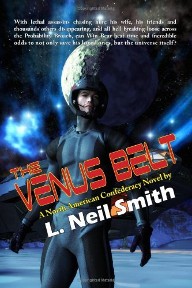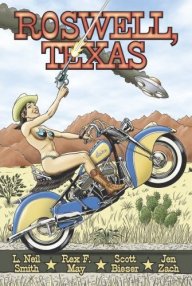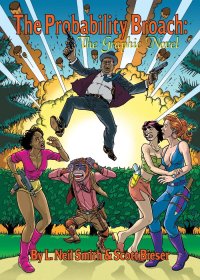
Letters to the Editor
from A.X. Perez, C. Jeffery Small, and Ward Griffiths
• FULL STORY
The Plague
by L. Neil Smith
Novelist Robert A. Heinlein famously observed that
humanity appears to be divided into two basic types, those who believe
that other people must be controlled, and those who believe nothing of
the sort. As usual, Heinlein—whose writings successfully predicted
a wide variety of future developments, from interplanetary spaceflight
to the waterbed—was far ahead of his time. Today, America teeters
on the brink of a civil war over that very question, whether individuals
ought to be controlled by others, or be left unmolested, to control
themselves.
• FULL STORY
My Response to an Example of Bumper-Sticker Philosophy
by Bill Hartwell
The following has apparently been making the rounds on
Facebook lately: "No one should die because they cannot afford health care,
and no one should go broke because they get sick. If you agree, please post
this as your status for the rest of the day." It's a nice, pretty idea, until
you sit down and consider the implications.
• FULL STORY
Sorry Folks, War is Actually Not Good For the Economy
by Andrew Syrios
In 1759, Voltaire wrote his satirical, Magnum Opus,
Candide, eponymously named after the main character, who after
leading a sheltered life for many years, comes to the realization that all
is not right in the world, and we must do our best to improve it. This is
in direct contradiction to his mentor, Pangloss, whose mantra is "all is
for the best in the best of all possible worlds." In other words, we are
already living in a utopia, it simply cannot get any better, which he
humorously (albeit darkly) explains to someone who just lost his whole
family after an earthquake. The idea that war has a good side effect
reminds me of the Leibnizian optimism (everything happens for the best)
that Voltaire so thoroughly refuted. Some things, such as war, may be
necessary, but they are in no way good, and have no silver lining.
• FULL STORY
A Shaman Speaks to those Bored of Directors
by Donald Meinshausen
I call myself a shaman. People wonder what I mean by this
term. Urban shamanism is not something learned in school, or a course of study
or even something you learn by studying under the tutelage of an elder of some
ancient tribe in a jungle. Many of our greatest writers on spirituality and mind
explorations in history do not have what we would call these types of credentials.
While I have spent time with the leading practitioners of my day I am largely
self-taught. While shamanism is often thought of rural if not of primitive tribes
it is making a recurrence in cities. Think of it as urbane renewal.
• FULL STORY
Atlantea The Beautiful
by L. Neil Smith and Rex May
Number 43 of a weekly cartoon series.
• FULL STORY
Agenda 21: The United Nations Programme of Action

Planning for Your future, serf!








